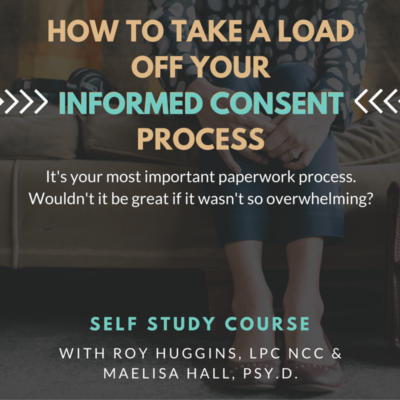How To Take a Load Off Your Informed Consent Process
1 CE Credit Hour. Legal-Ethical. Continuing Education Session Replay.
Presented By: Maelisa Hall, PsyD; Roy Huggins, LPC NCC
Course Description

There’s so much to do as part of informed consent these days: HIPAA notices, risk management-related disclosures, communications and social media policies, etc etc. It’s starting to feel like the intake session is nothing but paperwork!
Luckily, Maelisa Hall knows a lot about paperwork. She can help us develop strategies to reduce paperwork and take back the intake session so we can be effective and thorough in our informed consent process while also getting to focus on therapy as quickly as possible.
In this recorded seminar, Hall and Huggins explore both the important elements of informed consent as well as strategies for covering them more efficiently. They also discuss the use of “layering,” which is a method of managing the overall informed consent process of therapy that is growing in popularity.
This is an introductory-level course for counselors, marriage and family therapists, clinical social workers, and counseling and clinical psychologists.
Educational Objectives
- Structure the informed consent paperwork to contain needed information for clients and to facilitate the informed consent process
- Incorporate ethically and pragmatically necessary, tech-related paperwork items according to individual client needs
- Use layering to ensure the informed consent process is smooth, thorough, and addresses individual client needs
Syllabus
- What to include in your informed consent
- What is therapy like with you
- Potential benefits and drawbacks of counseling
- Limits to confidentiality
- Outline your fee and when (if) fees are reviewed
- Cancellation policy
- Potential sharing of information re: treatment planning, consultation, etc.
- Communications and Social Media Policies
- Any needed risk discussions around email, texting, or others
- Signatures
- How to talk with clients about informed consent
- Conversations, signatures and whether or not clients read your form
- Use layering, and decide what needs to be depthfully discussed now and what can be held for later
- Tips for simplifying the process
References
Presented/Developed By
 This seminar is co-written and presented by Maelisa Hall, PsyD, a specialist in private practice paperwork and the owner of QA Prep. Maelisa will be showing us processes that are both ethical and effective for ensuring your informed consent process is thorough enough for client and therapist needs but does not impede your work. She regularly teaches therapists to simplify and solidify their documentation and paperwork in order to free them up to just do therapy. The informed consent process is where that all starts.
This seminar is co-written and presented by Maelisa Hall, PsyD, a specialist in private practice paperwork and the owner of QA Prep. Maelisa will be showing us processes that are both ethical and effective for ensuring your informed consent process is thorough enough for client and therapist needs but does not impede your work. She regularly teaches therapists to simplify and solidify their documentation and paperwork in order to free them up to just do therapy. The informed consent process is where that all starts.
 Roy Huggins, LPC NCC, is a counselor in private practice who also directs Person-Centered Tech. Roy worked as a professional Web developer for 7 years before changing paths, and makes it his mission to grow clinicians’ understanding of the Internet and other electronic communications mediums for the future of our practices and our professions.
Roy Huggins, LPC NCC, is a counselor in private practice who also directs Person-Centered Tech. Roy worked as a professional Web developer for 7 years before changing paths, and makes it his mission to grow clinicians’ understanding of the Internet and other electronic communications mediums for the future of our practices and our professions.
Roy is an adjunct instructor at the Portland State University Counseling program where he teaches Ethics, and is a member of the Zur Institute advisory board. He has acted as a subject matter expert on HIPAA, security and clinical use of technology for Counseling licensure boards and both state and national mental health professional organizations. He has co-authored or authored 2 book chapters, and he routinely consults with mental health colleagues on ethical and practical issues surrounding tech in clinical practice. He served for 5 years on the board of the Oregon Mental Health Counselors Association and then the Oregon Counseling Association as the Technology Committee Chair.
He really likes this stuff.
Program Notices
Accuracy, Utility, and Risks Statement: The contents of this program are based primarily on the presenters’ extensive combined experience handling legal, ethical, and usable paperwork needs for mental health organizations. Statements about applicability are according to presenters’ understanding of the state of the art and legal precedents at the time of presentation. This program discusses strategies for complying with applicable ethics codes and laws, and for improving the informed consent process. It may not include information on all applicable state laws. Misapplication of the materials, or errors in the materials, could result in non-compliance with applicable laws or ethics codes.
Conflicts of Interest: None.
Commercial Support: None.
This course is subject to our cancellation/refund policy and complaint policy.

